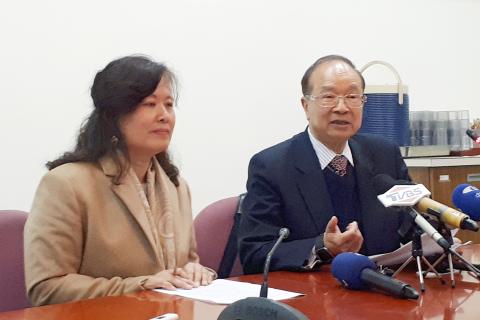After a six-hour meeting, the National Taiwan University (NTU) election committee yesterday decided to ratify the election of NTU president-elect Kuan Chung-ming (管中閔).
Kuan’s election has been controversial, because he has been accused of breaching research ethics and his position as an independent director of Taiwan Mobile (台灣大哥大) could be a conflict of interest.
The university said it forwarded information to the Ministry of Education (MOE) and the Ministry of Science and Technology showing that Kuan has no record of ethics breaches.

Photo: CNA
While NTU had hoped that the MOE would expedite Kuan’s approval, the ministry asked it to convene the election committee and clarify the matters in question.
It is not the committee’s place to say whether the result would have been different if Kuan had made his position at Taiwan Mobile known, it said.
Regarding the plagiarism accusation, the committee said it would respect the NTU Research Ethics Office’s decision that Kuan’s paper was not an official academic thesis and therefore should not be subjected to plagiarism standards.
The committee said it had observed all voting procedures, adding that it would issue a formal notice to the MOE of Kuan’s approval.
Committee convener Chen Wei-chao (陳維昭) said the public was aware of the decision as of Jan. 5.
However, the university opted to abide by MOE, Legislative Yuan and Control Yuan requests to convene the committee and clarify matters, Chen said, adding that all members attended the meeting.
“We hope Kuan can be sworn in today,” Chen said.
MOE Department of Personnel Director Chen Kun-yuan (陳焜元) said as of press time last night that the department had yet to receive the documents.
All official documents must be passed between the MOE’s Department of Legal Affairs and the K-12 Education Administration, so Kuan would not be able to be sworn in today, Chen Kun-yuan said, adding that the ministry is compelled to accept the results of the meeting.
The MOE is not concerned with the timing of when the procedures are completed, he added.
Additional reporting by Rachel Lin

DAREDEVIL: Honnold said it had always been a dream of his to climb Taipei 101, while a Netflix producer said the skyscraper was ‘a real icon of this country’ US climber Alex Honnold yesterday took on Taiwan’s tallest building, becoming the first person to scale Taipei 101 without a rope, harness or safety net. Hundreds of spectators gathered at the base of the 101-story skyscraper to watch Honnold, 40, embark on his daredevil feat, which was also broadcast live on Netflix. Dressed in a red T-shirt and yellow custom-made climbing shoes, Honnold swiftly moved up the southeast face of the glass and steel building. At one point, he stepped onto a platform midway up to wave down at fans and onlookers who were taking photos. People watching from inside

A Vietnamese migrant worker yesterday won NT$12 million (US$379,627) on a Lunar New Year scratch card in Kaohsiung as part of Taiwan Lottery Co’s (台灣彩券) “NT$12 Million Grand Fortune” (1200萬大吉利) game. The man was the first top-prize winner of the new game launched on Jan. 6 to mark the Lunar New Year. Three Vietnamese migrant workers visited a Taiwan Lottery shop on Xinyue Street in Kaohsiung’s Gangshan District (崗山), a store representative said. The player bought multiple tickets and, after winning nothing, held the final lottery ticket in one hand and rubbed the store’s statue of the Maitreya Buddha’s belly with the other,

‘COMMITTED TO DETERRENCE’: Washington would stand by its allies, but it can only help as much as countries help themselves, Raymond Greene said The US is committed to deterrence in the first island chain, but it should not bear the burden alone, as “freedom is not free,” American Institute in Taiwan Director Raymond Greene said in a speech at the Institute for National Defense and Security Research’s “Strengthening Resilience: Defense as the Engine of Development” seminar in Taipei yesterday. In the speech, titled “Investing Together and a Secure and Prosperous Future,” Greene highlighted the contributions of US President Donald Trump’s administration to Taiwan’s defense efforts, including the establishment of supply chains for drones and autonomous systems, offers of security assistance and the expansion of

STREAMLINED: The dedicated funding would allow the US to transfer equipment to Taiwan when needed and order upgraded replacements for stockpiles, a source said The US House of Representatives on Thursday passed a defense appropriations bill totaling US$838.7 billion, of which US$1 billion is to be allocated to reinforcing security cooperation with Taiwan and US$150 million to replace defense articles provided to the nation. These are part of the Consolidated Appropriation Act, which the US House yesterday passed with 341 votes in favor and 88 against. The act must be passed by the US Senate before Friday next week to avoid another government shutdown. The US House Committee on Appropriations on Monday unveiled the act, saying that it allocates US$1 billion for the Taiwan Security Cooperation Initiative